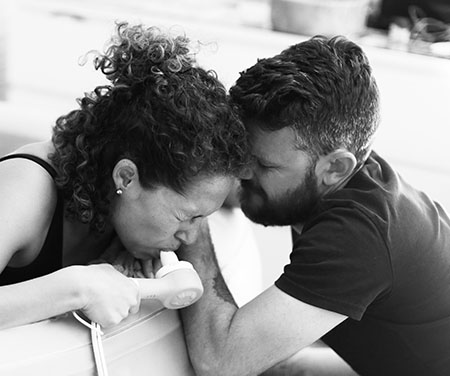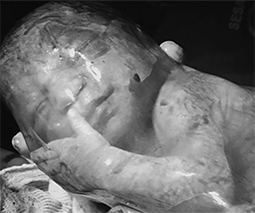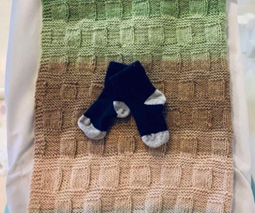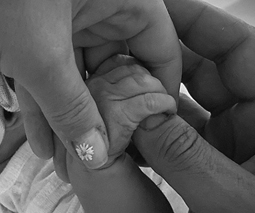Rebozo sifting: Is this the best labour pain relief we’ve never heard of?

If there’s one thing a woman knows for absolute sure, it’s that birth is going to be painful. We spend a great deal of our pregnancies wondering if we’ll be able to manage it, researching ways to cope with it, and for many of us, hoping to get through it without drug intervention.
So what if we told you there’s a brilliant drug-free technique to help with the pain and discomfort of pregnancy and labour – and all you need is a strong piece of fabric?
What is rebozo sifting?
‘Rebozo sifting’ is a traditional Mexican birthing technique still used by midwives and doulas today as a gentle and effective pain relief measure during pregnancy and labour, even being touted by midwives as potentially useful for helping get babies into the optimal position for birth.

Image: Spinning Babies
Also known as ‘rebozo manteada’, the technique involves using a scarf or other strong piece of fabric to gently rock the woman’s body, bringing relief to the muscles and ligaments around the abdominal and pelvic region.
A rebozo is a long, woven scarf-like garment popular in Mexico and used for many things, from carrying groceries and babywearing, to relaxing and repositioning mothers in childbirth. Manteada is the Spanish name of the technique used with the rebozo, and is described as “a gentle sifting, like a rhythmic jiggle“.
The technique is gaining popularity amongst midwives in other parts of the world, particularly in Denmark where a rebozo is used in around 9 percent of women who have a planned vaginal birth. And with the right training, even partners can have a go.
How does rebozo sifting actually work?
There are a number of ‘sifting’ techniques used by midwives to help relieve discomfort during pregnancy and labour.
The most commonly described technique involves wrapping the rebozo around the woman’s belly as she kneels over an exercise ball. However the rebozo may also be wrapped around the hips or buttocks as she leans against a wall or lies on a bed for support. A support person holds the ends of the rebozo and uses it to gently rock the woman’s hips or belly from side to side in a rhythmic motion. These movements have been described as pelvic massage, rocking or jiggling.
Here are a couple of common examples of rebozo sifting techniques:
Benefits of rebozo sifting
The ‘sifting’ technique is aimed at reducing tension in the pelvic muscles and ligaments. It is said to have multiple benefits for mother and baby, such as:
- Relaxing tight uterine ligaments and abdominal muscles
- Helping baby move into the correct position for birth
- Helping a birthing woman relax into her labour
- Helping her slow her breathing
- Reducing the need for medicinal pain relief
According to nurse Rebecca Dekker from Evidence Based Birth, “rebozos are not used to manually turn the foetus into a better position. Rather, it’s thought that the rebozo helps relax the muscles around the pelvis, which helps the baby get into a more optimal position for labour and birth.”
When should rebozo sifting be avoided?
While many women and midwives swear by this technique, there are some times when you should not use rebozo sifting, including:
- When some placenta complications are present (see your midwife or obstetrician for advice)
- When there is a threat of miscarriage, such as signs of bleeding or low cramping in early pregnancy
- When there is a history of multiple mid to late pregnancy miscarriages, or losses in past pregnancies
- If a technique is uncomfortable or a woman is not enjoying it then it must be stopped immediately
You should always consult with your care provider before using this technique to make sure that it doesn’t pose undue risk to you or your baby.
With modern births tending towards the clinical (97 percent of women in Australia birth in a hospital environment), it’s nice to know that some of these traditional techniques are still in use today, albeit in a more modern setting.
And any new (or old) techniques that may help relieve the pain of labouring mamas is a win in our book – when practiced with care and appropriate training, of course.
Want to use rebozo sifting?
In Australia, some midwives and doulas have undergone specific rebozo training, so if you are interested in having this as an option, talk to your care provider to find out if they have the skills you are looking for.
Rebozos are available for sale at Pregnancy, Birth & Beyond.
 Need some support to be the best parent you can be? Our Parent School parent coaching experts can help. Click to find out more or book a one-on-one session.
Need some support to be the best parent you can be? Our Parent School parent coaching experts can help. Click to find out more or book a one-on-one session.









